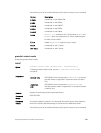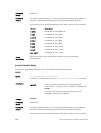ip ospf message-digest-key
Enable OSPF MD5 authentication and send an OSPF message digest key on the interface.
S4820T
Syntax
ip ospf message-digest-key keyid md5 key
To delete a key, use the no ip ospf message-digest-key keyid command.
Parameters
keyid Enter a number as the key ID. The range is from 1 to 255.
key Enter a continuous character string as the password.
Defaults No MD5 authentication is configured.
Command
Modes
INTERFACE
Command
History
This guide is platform-specific. For command information about other platforms,
refer to the relevant Dell Networking OS Command Line Reference Guide.
The following is a list of the Dell Networking OS version history for this command.
Version Description
9.7(0.0) Introduced on the S6000-ON.
9.0.2.0 Introduced on the S6000.
8.3.19.0 Introduced on the S4820T.
9.1(0.0) Included usage information on maximum number of digest
keys per interface.
8.3.11.1 Introduced on the Z9000.
8.3.7.0 Introduced on the S4810.
7.6.1.0 Introduced on the S-Series.
7.5.1.0 Introduced on the C-Series.
pre- 6.1.1.1 Introduced on the E-Series.
Usage
Information
You can configure a maximum of six digest keys on an interface. Of the available
six digest keys, the switches select the MD5 key that is common. The remaining
MD5 keys are unused.
To change to a different key on the interface, enable the new key while the old key
is still enabled. Dell Networking OS sends two packets: the first packet
authenticated with the old key and the second packet authenticated with the new
key. This process ensures that the neighbors learn the new key and communication
is not disrupted by keeping the old key enabled.
1288
Open Shortest Path First (OSPFv2 and OSPFv3)


















